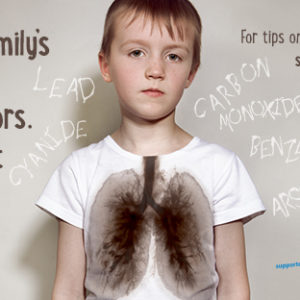
Smokers are being urged to keep their children and family smokefree as a campaign launches across the North East.
As the nights start to draw in, some smokers might relax rules around smoking. But smokers are being warned of the chemicals in tobacco smoke which can harm the family’s health, raising the risks of serious illness such as asthma and heart disease.
Worryingly, a survey in July in the North East found too many adults and children in the region are being exposed to harmful secondhand smoke:
- Around 54% of smokers smoke in the home when others are around – 28% on a daily basis
- In nearly half those occasions (45%) adult non-smokers are present, while 10% of the time children are present
The Secondhand Smoke is Poison campaign is launching from Fresh supported by the British Lung Foundation, encouraging people to visit the www.smokefreefamilies.co.uk website for tips and support to stop smoking.
Secondhand smoke contains poisons like carbon monoxide, lead, arsenic and benzene and lingers throughout the house long after you can smell it. And all the family are at risk:
- Children who live in a household with a smoker are more likely to develop asthma, chest infections like pneumonia and bronchitis, meningitis, ear infections, coughs and cold. (Source: uk)
- Among adults, second-hand smoke can worsen asthma and cause lung cancer and increases the risk of heart disease, stroke and Chronic Obstructive Pulmonary Disease (COPD).
Ailsa Rutter, Director of Fresh, said: “No-one wants to put their family at risk but it is clear that COVID has created its own pressures. The best thing anyone can do right now for their health and their family’s health is to stop smoking completely.
“We know the risks to children’s health – however secondhand smoke harms the health of adults too. This is a time when we all want to keep ourselves and our families fit and healthy and out of hospital, but living with tobacco smoke is a cause of heart disease, cancer, stroke and asthma.
“Smoking with the back door or window open does little to protect the family – quitting or taking it completely outside is the only way.”
Dr Malcolm Brodlie, consultant in paediatric respiratory medicine at the Great North Children’s Hospital, said: “Breathing in secondhand smoke is harmful to people from all age groups, but children are especially vulnerable as their lungs are still developing and they breathe faster than adults, so inhale more of the harmful poisons. There is no safe level of exposure.
“We see the effects of this on hospital wards too often. Children and babies who are exposed to second-hand smoke are more likely to develop coughs, wheeze, asthma and infections like pneumonia and bronchiolitis. Children exposed to smoke are also more likely to develop middle ear infections which can be painful and require medical attention. But adults are at risk too.”
Figures from the British Thoracic Society in 2016 suggest that one in three children who ends up in hospital with an asthma attack has been exposed to cigarette smoke.
In contrast to the known harm from secondhand smoke, there is no evidence of harm to bystanders from exposure to e-cigarette vapour. The many harmful chemicals in tobacco smoke are either not contained in e-cigarette vapour at all, or are usually found at much lower levels. The risks to bystanders from exposure to e-cigarette vapour are likely to be extremely low.
8 tips to help you keep the home smokefree
- The best thing for your help is to quit smoking – for local support visit http://www.smokefreefamilies.co.uk/ways-quit
- If you do want to smoke, the best way to protect your children from secondhand smoke is by taking several steps away from your house, making sure any children in the house are safe. Closing doors and windows will stop smoke drifting back in.
- Consider switching completely to a vaping device instead of tobacco.
- Try nicotine gum, lozenges, inhalator or spray just to get you through times you want to smoke at home and can’t get outside – such as during car journeys.
- Ask visitors who are smokers to go outside to smoke, or smoke before they arrive at your house.
- Remember it is illegal to smoke in a car with a child under 18 present. If you smoke in the car before your children get in, remember smoke can linger for hours – your child is still exposed to poisons even if you’ve just put a cigarette out.
- Make some practical changes to help you keep your home smokefree.
- If you are thinking of quitting smoking there’s lots of help and support to make it easier – visit https://www.nhs.uk/smokefree
